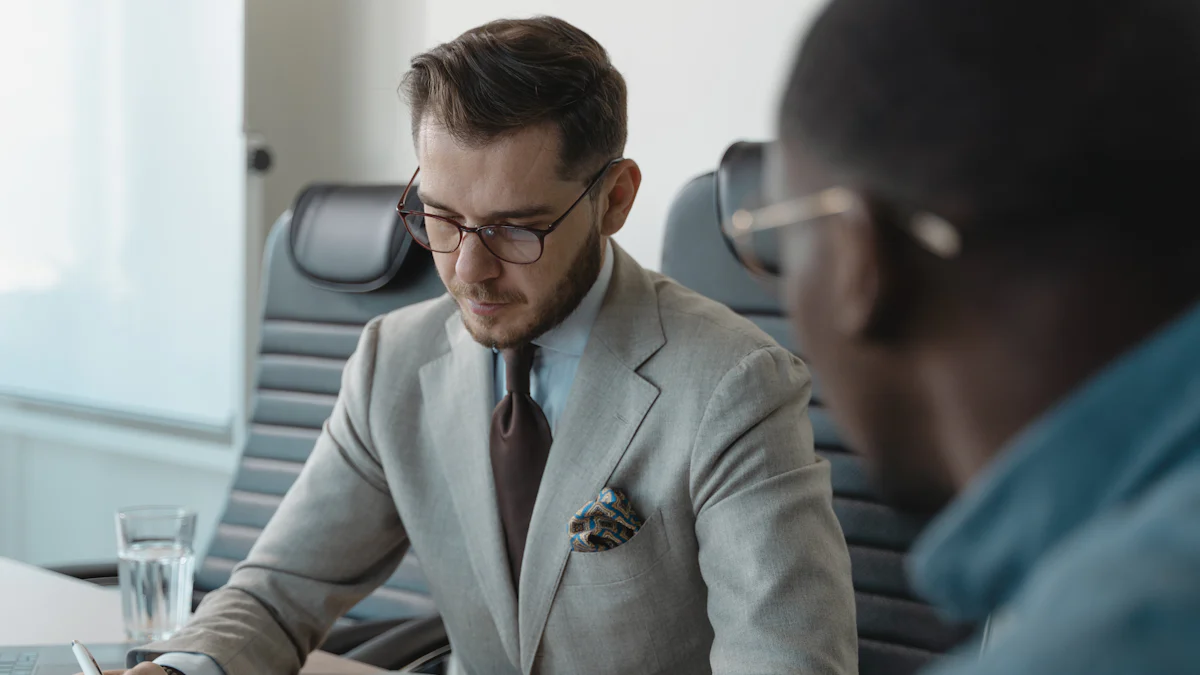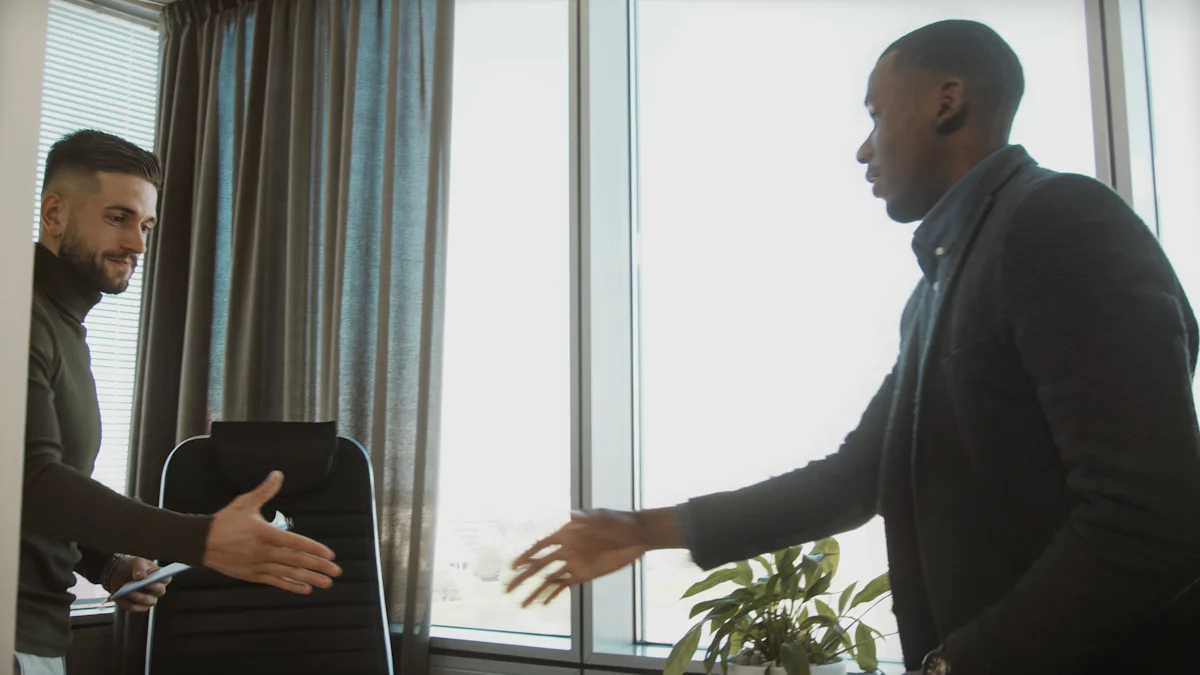Top Tips for Preparing for Your First Job Interview

Preparing for your first job interviews can make all the difference. When you take the time to get ready, you boost your confidence and improve your performance. Did you know that 94% of hiring professionals find interviews crucial for selecting the right candidates? This shows how important it is to be well-prepared for your first job interviews. Plus, a positive candidate experience can influence your decision to accept a job offer. So, dive into your preparation, and you'll walk into that interview room feeling ready to impress.
Pre-Interview Preparation for First Job Interviews
Getting ready for your first job interview involves more than just picking out an outfit. You need to dive deep into understanding the company and the role you're applying for. This preparation can set you apart from other candidates and boost your confidence.
Researching the Company
Before stepping into the interview room, you should know the company inside and out. This knowledge not only helps you tailor your responses but also shows the interviewer that you're genuinely interested in the job.
Understanding the company's mission and values
Start by exploring the company's mission and values. For instance, Tesla aims to accelerate the world’s transition to sustainable energy. Knowing this, you can align your answers to reflect how your personal values resonate with theirs. Similarly, Zappos emphasizes delivering happiness and outstanding service. Understanding these core principles can help you demonstrate how you fit into their culture.
Familiarizing yourself with recent news and developments
Stay updated with the latest news about the company. Check their website, blog, or recent press releases. For example, if a company has recently launched a new product or initiative, mention it during your interview. This shows that you've done your homework and are keen on being part of their journey.
Understanding the Job Description
The job description is your roadmap to success in the interview. It outlines what the company expects from you and gives you clues on how to present yourself as the ideal candidate.
Identifying key responsibilities and required skills
Carefully read through the job description to identify the key responsibilities and required skills. Make a list of these and think about how your past experiences align with them. If the job requires teamwork and problem-solving skills, prepare examples from your past where you demonstrated these abilities.
Aligning your experiences with the job requirements
Once you've identified the key responsibilities, match them with your experiences. Think about specific instances where you used similar skills or tackled similar challenges. This alignment not only helps you answer questions confidently but also makes your responses more relevant and impactful.
By thoroughly researching the company and understanding the job description, you set yourself up for a successful first job interview. This preparation not only boosts your confidence but also ensures that you make a lasting impression on your potential employer.
Practicing for Your First Job Interview
Getting ready for your first job interview involves more than just knowing about the company. You need to practice answering common interview questions to build your confidence and ensure you present yourself effectively. Let's dive into some strategies that can help you shine during your interview.
Common Interview Questions
When preparing for an interview, it's crucial to anticipate the questions you might face. FlexJobs, a leader in job interview tips, emphasizes the importance of being ready for these questions. Here are some you should definitely prepare for:
Preparing answers for typical questions like "Tell me about yourself"
This question often kicks off the interview. It's your chance to make a strong first impression. Start by summarizing your background, highlighting your skills, and explaining why you're interested in the job. Keep it concise and relevant to the position you're applying for.
Developing responses for questions about strengths and weaknesses
Interviewers love to ask about your strengths and weaknesses. For strengths, focus on qualities that align with the job requirements. When discussing weaknesses, choose something you're actively working to improve. This shows self-awareness and a commitment to personal growth.
Using the STAR Method
The STAR method is a powerful tool for structuring your responses. It helps you provide clear and concise answers that highlight your achievements.
Structuring answers with Situation, Task, Action, and Result
When using the STAR method, start by describing the Situation and Task you faced. Then, explain the Action you took and the Result you achieved. This approach ensures your answers are well-organized and impactful.
Crafting personal stories that highlight your achievements
Think about past experiences where you made a difference. Use these stories to demonstrate your skills and accomplishments. Personal stories make your responses memorable and show the interviewer how you can add value to their team.
By practicing these techniques, you'll feel more prepared and confident during your first job interview. Remember, practice makes perfect. Consider doing a practice interview with a friend or mentor to get feedback and refine your answers. With the right preparation, you'll be ready to tackle any interview questions that come your way.
Making a Strong First Impression in a Job Interview

Walking into your first job interview can feel daunting, but making a strong first impression is key to success. Managers often form opinions about candidates within the first few minutes, so it's crucial to present yourself well right from the start. Let's explore how you can make a good impression through body language and engaging small talk.
Body Language and Appearance
Your body language speaks volumes before you even say a word. It can convey confidence and professionalism, which are essential in making a good impression.
Maintaining eye contact and a confident posture
Maintaining eye contact shows that you're engaged and interested in the conversation. It helps build a connection with the interviewer and demonstrates your confidence. Stand or sit up straight with your shoulders back. A confident posture not only makes you appear self-assured but also helps you feel more confident internally.
Dressing appropriately for the company culture
Your appearance is the first thing the interviewer notices. Dressing appropriately for the company culture shows that you've done your homework and respect their environment. If you're unsure about the dress code, it's better to err on the side of being slightly more formal. A polished appearance can leave a lasting impression and set the tone for the rest of the interview.
Engaging in Small Talk
Small talk might seem trivial, but it plays a significant role in building rapport with the interviewer. It can ease you into the interview and make the atmosphere more relaxed.
Building rapport with the interviewer
Start with a friendly greeting and a firm handshake. A simple comment about the weather or the office environment can break the ice. Engaging in small talk helps establish a connection and shows that you're personable. It sets a positive tone for the rest of the interview.
Using small talk to ease into the interview
Small talk can help calm your nerves and make you feel more comfortable. It gives you a moment to settle in before diving into the more formal part of the interview. Use this time to observe the interviewer's demeanor and adjust your approach accordingly. This adaptability can leave a lasting impression and demonstrate your interpersonal skills.
By focusing on your body language and engaging in small talk, you can make a good impression during your first job interview. These elements, combined with your preparation and practice, will help you leave a lasting impression on your potential employer.
Managing Nerves During the Interview
Feeling nervous before a job interview is completely normal. But managing those nerves can make a big difference in how you perform. Let's explore some techniques to help you stay calm and focused during your interview.
Techniques for Staying Calm
Practicing deep breathing exercises: Deep breathing can be a powerful tool to calm your nerves. Before your interview, take a few moments to breathe deeply. Inhale slowly through your nose, hold for a few seconds, and then exhale through your mouth. This simple exercise can help reduce anxiety and clear your mind.
Visualizing a successful interview: Visualization is another effective technique. Close your eyes and imagine yourself walking into the interview room with confidence. Picture yourself answering questions smoothly and impressing the interviewer. This positive imagery can boost your self-belief and set a positive tone for the actual interview.
Staying Focused and Present
Listening actively to the interviewer: During the interview, focus on what the interviewer is saying. Active listening involves nodding, maintaining eye contact, and responding appropriately. This not only shows your interest but also helps you understand the questions better, allowing you to provide thoughtful answers.
Taking a moment to think before answering: It's okay to pause and gather your thoughts before responding to a question. This shows that you're considering your answer carefully. A brief pause can help you articulate your thoughts more clearly and avoid rushing into an answer that might not fully represent your skills or experiences.
Remember, each interview is a learning opportunity. Even if you don't get the job, you'll gain valuable experience that will help you in future interviews. By practicing these techniques, you'll manage your nerves more effectively and present yourself as a confident and capable candidate.
Following Up After the First Job Interview
Congratulations on completing your first job interview! Now, it's time to focus on the follow-up. This step is crucial in leaving a lasting impression and showing your enthusiasm for the position. Let's dive into some effective strategies for following up after your interview.
Writing Thank You Notes
Sending a thank you note is a simple yet powerful way to express your appreciation. It shows that you value the opportunity and respect the interviewer's time.
Expressing gratitude for the opportunity
Start your thank you note by expressing your gratitude. A simple "thank you for the opportunity to interview" goes a long way. It acknowledges the time and effort the interviewer invested in meeting with you. This small gesture can set you apart from other candidates.
Reiterating your interest in the position
After expressing gratitude, reiterate your interest in the job. Mention specific aspects of the role or company that excite you. This reinforces your enthusiasm and reminds the interviewer why you're a great fit. A well-crafted thank you note can leave a positive impression and keep you top of mind.
Asking for Feedback
Feedback is a valuable tool for growth. It helps you understand your strengths and areas for improvement.
Seeking constructive criticism to improve
Politely ask for feedback on your interview performance. You might say, "I would appreciate any feedback you could provide to help me improve." Constructive criticism can guide your future interview preparation and make you a stronger candidate.
Understanding the next steps in the hiring process
Inquire about the next steps in the hiring process. This shows your eagerness to move forward and keeps you informed. You can ask, "Could you please let me know what the next steps are?" Knowing the timeline helps you manage your expectations and plan accordingly.
Following up after your first job interview is an essential part of the process. By sending a thoughtful thank you note and seeking feedback, you demonstrate professionalism and a genuine interest in the position. These interview tips will help you stand out and increase your chances of landing the job.
Preparation and practice are your best allies for interview success. Each first job interview is a chance to learn and grow. Embrace it as an opportunity to refine your skills and gain insights. Remember, every question asked and every interaction with the company adds to your experience. Approach your first job interview with confidence, knowing that you're ready to impress. By applying these tips, you'll not only avoid common interview mistakes but also stand out as a strong candidate. So, step into that room with assurance and let your potential shine.